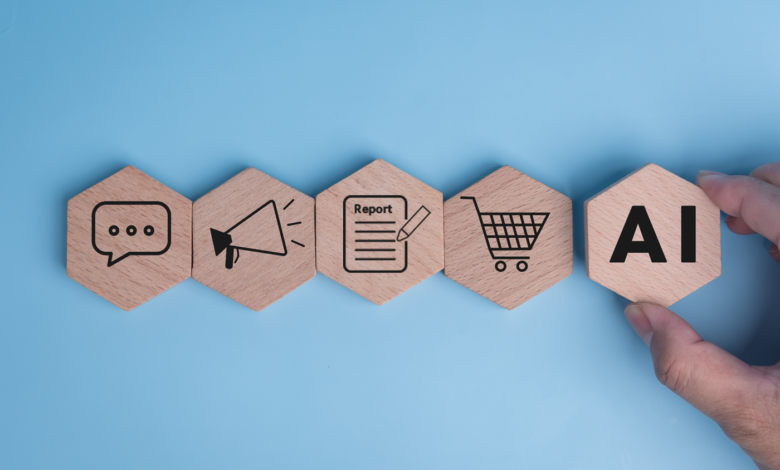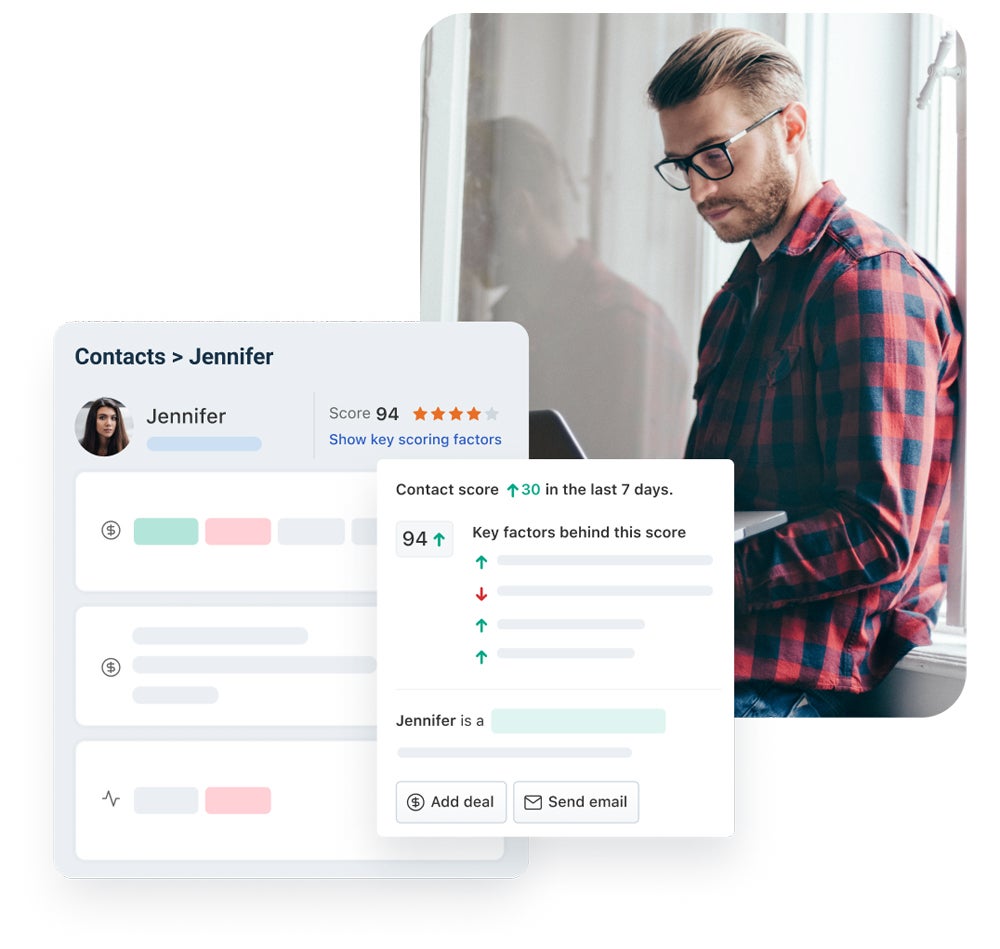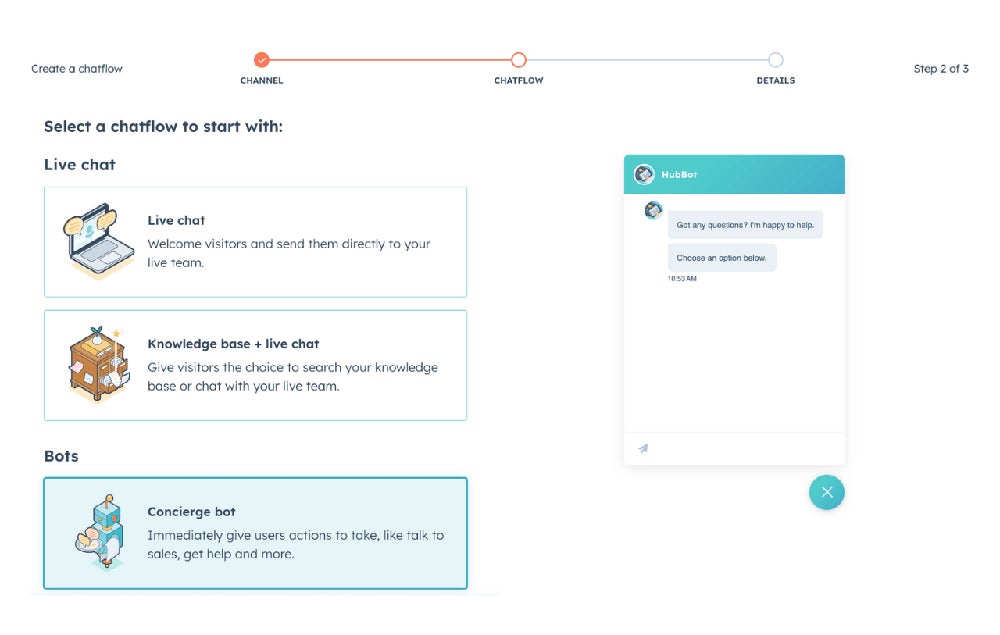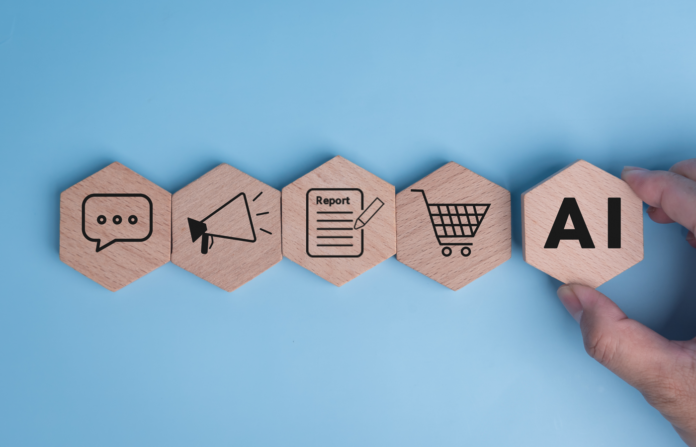How AI is Reshaping Customer Experiences

Customer relationship management (CRM) systems have been transformed through the power of artificial intelligence, providing businesses with a smarter way to manage customer experiences and drive customer loyalty at all stages.
In this guide, learn more about how AI can be used in CRMs and how your organization can create AI-powered workflows that make sense for your customer relationship management goals and expectations.
What is AI in Customer Relationship Management?
AI in customer relationship management is the use of artificial intelligence software, algorithms, services, and best practices to optimize customer data analytics and lifecycle actions, typically within a CRM platform.
AI in customer relationship management is often used to improve and update customer data in real time, create more engaging customer experiences, expand data-driven knowledge for decision-makers, and automate different aspects of nurturing and working with the customer.
With AI in CRM, marketers, salespeople, and service representatives alike can better handle their day-to-day workflows with automations, integrations, and recommendations that are “smart” and based on up-to-date performance metrics and recent customer interactions.
To learn about AI for customer relationship management, read our guide: Top 8 AI CRM Software
How CRMs Use AI to Improve Customer Experience
CRMS use data to improve everything from customer data to customer communications and outreach plans. These are some of the most common AI CRM use cases that focus on improved customer experience:
- Reporting and predictive analytics: AI technology is used to collect better data and derive more in-depth information about customer sentiment, performance problems, and other issues that may impact customer experience. From there, many AI analytics solutions can also offer AI-powered recommendations for how to address these shortcomings most effectively.
- Tailored content creation: Generative AI tools can be used to create dynamic web and ad content, personalized emails, and other types of outreach that focus on everything from a customer’s global region to their past buying history to reviews they’ve left on third-party sites. When content is created specifically for individuals, they’re more likely to feel connected and loyal to the brand that’s creating this content.
- Workflow automation: Particularly in the nurture stage of the customer lifecycle, AI can set up complex, always-operational workflow automations so these customers receive regular personalized communications that keep them engaged and satisfied with the service they’re receiving.
- Audience segmentation: A task that has often been done manually (and tediously) in the past, audience segmentation is now frequently handled by AI bots built into the CRM. Based on the data that’s available for each customer profile, AIs can expertly divide these customers into the funnels and outreach groups that make the most sense for their interests and buying history.
- Sentiment analysis: Instead of having a human scour third-party review sites, social media messages, and dozens of chat logs, AI technology can quickly scan through all of these data sources to identify overall sentiments and the sentiments of individual customers in your database. From there, it can make recommendations on any larger changes that need to be made or how to take a better approach based on a specific customer’s frustrations.
- Personalized product recommendations: With the data you’ve collected and that’s been identified over time, AI CRMs have enough knowledge of individual customers to make ultra-personalized product recommendations. This could include upselling and cross-selling based on recent purchases or activity. The likelihood of closing these kinds of deals is all about the relevance and timeliness of recommendations, which are two areas in which AI excels.
- Chatbots and virtual assistants: AI assistants can be used to support both internal employee work and external customer interactions. Especially because most chatbots and copilots are available 24/7, users can complete their work and customers can ask questions whenever it’s convenient for them.


How to Implement AI in Customer Relationship Management
Use CRMs with Native AI
While it is certainly possible to integrate or embed third-party AI technology into your chosen CRM platform, AI will run your workflows and initiatives more seamlessly if it is natively offered as part of the CRM software.
Many of the top CRMs today have built-in AI automation, workflow management, data analytics, and content management features, so take the time to research your own CRM — or prospective CRMs, if you’re on the market — to determine what capabilities are already built into the system. Using a CRM with inbuilt and proven AI functionality will make the adoption and implementation process go more quickly and smoothly.


Map Out Strategic Goals & Outcomes
Before getting started with AI and exploring its capabilities, set your sights on the customer relationship management goals you’re hoping to accomplish with the help of AI. These goals can be far-reaching and generic, but it helps to also set some more specific goals with tasks and initiatives that will help you achieve those outcomes.
Start with highly measurable goals that make the most impact on your business’s customers — and your bottom line — such as the following examples:
- Improve overall customer satisfaction by increasing the organization’s Net Promoter Score (NPS) by 10 points over the next eight months.
- Use AI chatbots to resolve 25% of customer service inquiries and concerns during the customer’s first interaction; make this possible within the first year of AI chatbot adoption.
- Increase customer retention rate by 5% within the year by using AI to improve lead scoring, identify churn risks, and develop targeted customer retention email campaigns.
Other strategic goals for AI in CRM may focus on AI analytics adoption, customer lifecycle management, task automation, and other areas of the CRM workflow where new efficiencies can quickly be realized.
To gain a deeper understanding of today’s AI software for sales, read our guide to AI Sales Tools and Software
Improve Data Quality Prior to AI Adoption
AI does its best work when its training and sourcing data is high quality. Artificial intelligence in CRM technology is a particularly unique enterprise use case of AI, as much of the work that it does focuses solely on your organization’s collected and stored data. This makes it all the more important for your team to prioritize data quality management: cleansing, deduplicating, fact-checking, and updating data are all important parts of this step in the process.
At this time, you’ll also want to consider if your data sources are updated and relevant. When working with customer and customer-service-focused data, it’s important to rely on data from all kinds of customer service channels, including websites, product pages, social media channels, and customer service phone calls and chats. You may want to get even more granular, looking at specific responses to outreach campaign emails, the details of past customer service tickets, and responses to customer surveys and third-party review sites.
Adopt AI Use Cases & Workflows Iteratively
Even if you’re working with a highly sophisticated CRM like Salesforce or HubSpot that offers AI bells and whistles across its feature set, it’s important to not get caught up in the excitement and instead approach AI adoption with cautious logic. Start with your most important goals that you set out before, and take the time to lay out a clear project plan for implementing and adopting this AI use case across your team(s).
The lessons you learn from initial rounds of AI adoption and change management will prepare you to tackle other areas of your AI CRM more efficiently and effectively. Iterative adoption takes time, but it ultimately saves most companies time, as they don’t have to go back to fix repeated errors too often.
Test & Monitor Performance
After initial adoption and implementation, you’ll want to monitor AI technology performance in your CRM to make sure it’s meeting your needs and not creating new errors or problems in your workflows.
While actual performance data may be measurable with usage data in your CRM’s settings, you’ll also want to get creative and look at how customers feel about their AI-based interactions. Make reviewing customer feedback — especially comments on the quality of AI bots — part of your process so you can immediately identify and address any issues customers are having with “nonhuman” support staff or communications.
Develop a Handoff Process for AI Assistants & Human Support staff
If you’ve decided to use AI as part of your customer service chatbot workflows, don’t forget that AI technology still has its limitations, especially when AI chatbots are in the early days of training and learning your organizational data. Human support staff should remain available at least during regular business hours, as they will occasionally need to take over and handle customer service queries directly.
But even in after-hours scenarios, develop a system where unresolved AI customer service conversations can be passed to the next-available human support staff. Customers will quickly become frustrated if they feel like there’s no way for them to get in touch with an actual company representative for their more complicated questions, especially if the AI chatbot is giving canned or irrelevant responses to their questions.
6 Benefits of Integrating AI into CRM
Integrating artificial intelligence into your CRM can lead to benefits for the business as a whole as well as for key players on the team and the customers themselves. Here are a few of the ways in which both customers and businesses benefit from AI in CRM:
Smart & Timely Data Analytics
AI can support better data collection and cleansing methods while also getting more useful insights out of this data. In essence, AI in a CRM can help manage data and data analytics throughout the data lifecycle.
Most important, AI can operate in the background of all customer service channels at all times, meaning this data can be updated in real time. Having up-to-date, accurate, and diverse customer data at all times leads to more data analytics possibilities, particularly for businesses that want to identify and address any customer churn risks.
Time-Savings Through Workflow & Task Automation
Artificial intelligence can write emails and blog posts, handle customer service queries, organize tasks and action items, and set up strategic outreach campaigns that reach the right people at the right times.
All of these tasks would typically require human intervention on a daily or weekly basis, which takes significant time out of their work schedules. As AI is used to automate and take over employees’ most tedious tasks, they can spend more time working on high-level strategy and customer nurturing campaigns that lead to greater company growth and customer retention potential.
Revenue Growth Potential
Customers who are happier with the outreach and support they receive are more likely to become loyal, repeat customers or even brand advocates. When your brand develops this reputation among loyal customers, you’ll not only earn more of their business but will likely attract more customers who are interested in receiving the same levels of attention and care.
More Personalized Shopping Experiences
With the ability to connect multichannel customer data in nearly any format, AI-powered CRMs have all the data necessary to better personalize shopping experiences for customers. They are more likely to see relevant targeted ads, receive email campaigns on sales or deals that interest them, and get customer support resources that addresses the real struggles they’re having with your products or services.
In sum, AI enables a personal touch that is difficult to replicate on such a large scale with limited human workforces.
Less Spam
AI is frequently used to target CRM outreach campaigns at prospective buyers and current customers who are most likely to be interested in that specific message and buying suggestion. This means customers receive fewer unwanted, spam messages from your organization; they’ll be happier with the communications they do receive from you, and you’ll likely get more engagement from those messages as well.
Real-time Support Services
AI chatbots aren’t limited to a 9-to-5 job schedule or the hours a business can afford to staff. In most cases, AI chatbots can stay up and running at all hours, leading to no additional costs for businesses.
However, customers certainly benefit, as they can get answers to many of their most pressing questions at any time of the day. This is an especially effective feature for global businesses that support customers in varying time zones.
3 Leading CRM Solutions Using AI
![]()
HubSpot
HubSpot is a leading CRM platform that divides its system into core hubs: the Marketing Hub, Sales Hub, Service Hub, Content Hub, Operations Hub, and Commerce Hub can all be used together or independently.
Within the Service Hub section, AI focuses primarily on offering real-time customer support and smart insights to business users. HubSpot’s AI features include different generative AI tools to create content for web, email, and social media; AI summarization; brand voice management; chatbot building; and unified customer record management.
![]()
Pipedrive
Pipedrive is a sales-focused CRM platform that combines some of its own AI technologies with OpenAI products to create AI-driven solutions and experiences. While Pipedrive’s AI solutions mostly support sales workflows and use cases, Pipedrive’s AI email generator and email summarization can both be used to create and manage content for customer service scenarios.
![]()
Freshsales
Freshsales is a sales CRM that also includes robust customer service and relationship management capabilities. With its Freddy AI collection of AI features, business customers can benefit from intelligent self-service chatbots, the Freddy Copilot for operational support and task management, and Freddy Insights for data-driven decision-making and risk management.
Bottom Line: AI is Reshaping Customer Relationships
For many years, customers have dreaded the possibility of needing to interact with a “robot” to get the answers they want when online shopping. While this dread still exists at some level, the development of AI and generative AI are offering drastic improvements, making it increasingly difficult for customers to tell the difference between a human-driven and an AI-driven interaction; AI tends to give them the answers they need with minimal human intervention.
Moreover, AI has reached the point where it can surpass human customer service representatives’ abilities in certain key areas, including collecting and applying real-time customer data and automating various outreach and lead management tasks. Expect AI to continue its rapid evolution in this sector and within CRM software, especially as businesses continue to realize how more tailored customer data and experiences lead to more revenue.
For a full portrait of the AI vendors serving a wide array of business needs, read our in-depth guide: 150+ Top AI Companies




